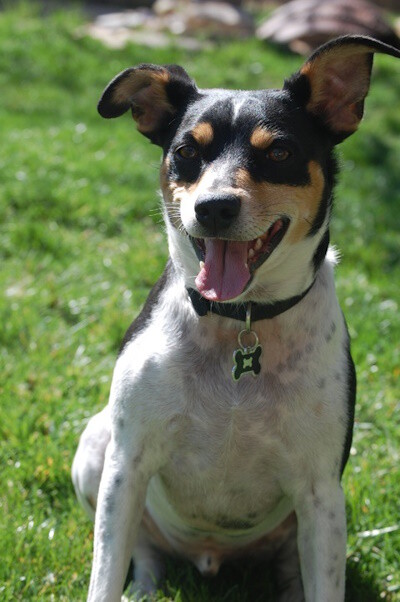Robust and resilient, the Rat Terrier is a breed that boasts a blend of vivacity and versatility. You’ve likely noticed their compact size and keen expression, trademarks of a dog bred not only for companionship but also for competent pest control.
As you explore this perky pup’s personality, you’ll discover a dog with a heart that outpaces its stature, an intelligence that demands engagement, and an affectionate nature that seeks your companionship.
While their maintenance might seem minimal, don’t be misled; their energetic ethos requires a dedicated hand to channel their spirited liveliness. If you’re considering a canine companion that matches your active lifestyle, stay tuned to discover if the Rat Terrier could perfectly fit your family dynamic and daily routine.
- Noise Level
- Energy
- Sociability
- Trainability
- Care
- Health
Overall
Summary
The Rat Terrier is known for its moderate noise level, high energy, sociable nature, and ease of trainability. They require moderate care and are generally healthy dogs.
Rat Terrier: Traits, Temperament, and Care Guide
Rat Terriers, renowned for their vibrant and fearless nature, offer a unique blend of traits that make them excellent companions and vigilant watchdogs. As a Rat Terrier parent, you’ll find their temperament a dynamic mix of affection and fearlessness.
With high energy levels, they demand regular exercise and mental stimulation to stay content. Your Rat Terrier is highly intelligent and eager to learn, responding best to positive reinforcement methods.
Channeling their prey drive through constructive play and work is crucial. These family dogs thrive on companionship and fit into the pack seamlessly, provided you commit to early socialization.
Follow this care guide to ensure your Rat Terrier leads a balanced life and fosters a sense of belonging within your family unit.
Exploring the Characteristics of the Rat Terrier
Delving into the characteristics of Rat Terriers, you’ll discover a dog breed that embodies a perfect balance of athleticism and vivacity, ideally suited for those who value a high-spirited and engaging canine companion. Their strong prey drive, typical of a small to medium breed, reflects their historical role in hunting and farm life.
Here’s a concise Rat Terrier breed profile:
| Aspect | Detail |
|---|---|
| Size | Small to medium, 10-25 pounds |
| Coat | Short, requires minimal grooming |
| Exercise Needs | At least an hour a day, prefers fenced space |
| Common Health Issues | Prone to certain genetic problems |
| Suitability | Spirited and energetic, not ideal for quiet apartment living |
Rat Terrier: A Comprehensive Profile and Guide
You’re about to get an all-encompassing look at the Rat Terrier, a breed that marries agility with a vibrant temperament.
From their modest American roots to their role as tenacious hunters and affectionate companions, these dogs carry a legacy as robust as their health.
Understanding their exercise needs, potential for excessive barking, and the intelligence that makes them highly trainable will guide you in determining if a Rat Terrier is the right fit for your lifestyle.
Everything You Need to Know
If you’re considering a canine companion that combines a compact size with a vibrant personality, the Rat Terrier offers a blend of athleticism and intelligence that makes for an engaging pet. Here’s everything you need to know:
- Rat Terrier Breed Information:
- The Rat Terrier is an American breed, developed in the early 20th century.
- They were created through a mix that includes the Teddy Roosevelt Terrier.
- They’re bred to hunt and possess a strong prey drive.
- Diet and Health:
- A balanced diet is crucial for Rat Terriers.
- They tend to be robust but watch for common issues such as dental problems and allergies.
- Variations:
- The Decker Rat Terrier is a larger variant known for its hunting prowess.
- These dogs need sufficient exercise to match their energy levels regardless of the type.
Discovering the Temperament
With their energetic and lively disposition, Rat Terriers exhibit a feisty spirit that, coupled with their alertness and affection, makes them charismatic and engaging pets.
As a breed, Rat Terriers are intelligent and spirited, often displaying a confident and fearless temperament that makes them excellent watchdogs. Their strong prey drive necessitates early socialization and consistent training to channel their energy positively.
You’ll find that their devotion and spirited playfulness endear them deeply to their families, fostering a sense of belonging. However, be mindful of their stubborn streak, which requires patience and creative training techniques.
These Terriers are also quite vocal, using barks and mumbles to express themselves and engage with you, their beloved companion, demanding attention and regular exercise to maintain their well-being.

Rat Terrier: Is It a Good Fit for Families?
Considering a Rat Terrier for your family? They’re affectionate and can bring great joy to an active household, especially since they thrive on playful interaction and exercise.
However, it would be best to channel their high energy and prey drive with early socialization and engaging activities to prevent unwelcome behaviors.
Assessing Rat Terrier’s Compatibility with Families and Kids
When assessing the Rat Terrier’s compatibility with families and particularly those with children, it’s crucial to consider their need for companionship and the time required for their exercise and training. Here are key points to consider:
- Affectionate Nature: Rat Terriers bond closely with family members, thriving on interaction. Their affectionate nature makes them great family pets, often well-suited to apartment living, provided they get enough exercise.
- Terriers Need Activity: These generally healthy dogs have energy to spare. Ensure they receive daily playtime and walks to prevent boredom-related mischief.
- Kid-Friendly Considerations: While Rat Terriers can be kid-friendly, their small dog stature and prey drive call for supervision around young children and other small pets.
Rat Terrier Flexibility
Often overlooked for their versatility, Rat Terriers possess an innate flexibility that allows them to adapt seamlessly to various living situations, from cozy apartments to spacious homes. As one of the more adaptable dog breeds, these small to medium-sized canines are quick learners, making them highly responsive to training techniques.
Obedience training is a breeze with these bright pups, who exhibit boundless energy yet can channel it through constructive activities.
Your Rat Terrier’s high energy can make them escape artists if not properly engaged, so it’s vital to provide regular exercises, mental challenges, and socialization. This ensures they remain adaptable to various daily routines, whether your lifestyle is constantly on the go or more relaxed and home-centered.

Curbing Stubbornness in Rat Terriers
As you train your Rat Terrier, you’ll find that its intelligence can sometimes manifest as stubbornness. You must utilize positive reinforcement to encourage cooperation and maintain a firm, consistent approach to establishing clear rules.
Providing plenty of mental stimulation and interactive play will curb their obstinate tendencies and strengthen your bond with them.
Effective Training Strategies
Consistent, positive reinforcement training techniques from an early age are crucial to curbing rat terriers’ stubborn tendencies effectively. Terriers are highly trainable, and with the right approach, you can mold their energetic nature into positive behaviors. If you’re considering a Rat Terrier, ensure you’re committed to their training, whether you have a puppy or adult dog.
| Strategy | How It Helps |
|---|---|
| Consistency | Builds reliable responses to commands |
| Positive Rewards | Reinforces good behavior without punishment |
| Interactive Toys | Stimulates mind, curbs boredom-driven antics |
Interactive dog toys keep dogs engaged and can prevent the desire to take off after anything that moves. Start young to instill the traits that make a well-behaved companion. Remember, dogs are always ready to learn; it’s up to you to guide them.
Exercise and Grooming Needs
Rat Terriers thrive on daily physical activity and require consistent grooming to maintain their overall well-being.
These energetic dogs need at least an hour of exercise each day. Daily walks and a fenced-in area for free play help control their high energy levels and keep your dog healthy and happy.
As part of their exercise and grooming needs, use a soft brush weekly to remove loose hair and keep their coat in top condition. It’s crucial to check their ears for debris and signs of infection, ensuring a small issue doesn’t escalate.
Moreover, they prioritize their dental hygiene; daily teeth brushing wards off oral health problems. Bathing your Rat Terrier as necessary, especially during shedding seasons, will promote a clean and vibrant coat.

Health Considerations
As you consider a Rat Terrier as your companion, be aware that their lifespan often reflects their health status, which genetic predispositions can impact to certain conditions. You’ll need to stay vigilant about their health care, schedule regular veterinary check-ups, and adopt preventative measures against common issues like dental disease and parasites.
Understanding and addressing these health risks early on can help ensure your Rat Terrier enjoys a long, robust life.
Common Health Issues and Lifespan
Boasting a lifespan ranging from 15 to 18 years, Rat Terriers are generally robust dogs, yet they’re prone to specific health issues that require vigilant care and regular veterinary oversight. As a Rat Terrier owner, you’re part of a community that values proactive health screenings to manage common health issues and enhance your dog’s quality of life.
These screenings are essential in detecting early signs of heart disease, hip dysplasia, and patellar luxation—conditions that Rat Terriers may be susceptible to.
Besides genetic health conditions, Rat Terriers can face dental disease, skin allergies, and obesity. It’s important to maintain a routine that includes dental care, a balanced diet, and regular check-ups to mitigate these risks.
Is Rat Terrier the Right Dog for You?

Considering a Rat Terrier as your next pet requires assessing whether their high-energy and playful nature aligns with your lifestyle and household dynamics.
It’s important to note that while Rat Terriers are generally healthy, like all terrier breeds, they may face common health issues that you should be aware of.
Their strong prey drive necessitates early socialization, especially if you have other small pets.
They make excellent family dogs, often bonding tightly and offering affectionate companionship akin to man’s best friend.
Before deciding, weigh the pros and cons of this individual dog breed. Always research to ensure that a Rat Terrier fits seamlessly into your life.
Alternatives for Rat Terrier: Energetic and Versatile Small Breeds
Explore these breeds if you appreciate the Rat Terrier’s energy and versatility, perfect for those who enjoy lively and adaptable small dogs.
| Similar Dogs | Short Description |
|---|---|
| Jack Russell Terrier | A small, energetic breed, known for its bold and hunting character. |
| Miniature Pinscher | Small but assertive, known for its energy and strong character. |
| Fox Terrier | A breed with a lively temperament and keen hunting abilities. |
| Boston Terrier | Known for its friendly and cheerful disposition, great for city living. |
Conclusion
As the sun dips low, envision your days enlivened by the zestful spirit of a Rat Terrier. Their boundless energy and sharp intellect demand your engagement; a true test of companionship.
In their bright eyes lies a challenge—a call to adventure that demands physical vigor and mental acuity. They aren’t just pets but partners in life’s dance.
So, if your world is ready for the whirlwind of joy they bring, the Rat Terrier awaits your lead.